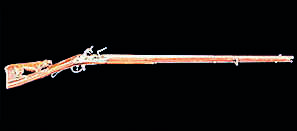LONDON: A rare 18th century decorated gun made in India for Mysore ruler Tipu Sultan, and valued at around 2 million, has been barred from export to allow time for a UK-based institution to acquire it for the public study of a “fraught period” in the India-UK history and in the hope that it can be put on public display in the UK.
UK arts and heritage minister Stephen Parkinson took the decision last week to impose the export ban on the “Flintlock Sporting Gun” following advice from the Reviewing Committee on the Export of Works of Art and Objects of Cultural Interest. The 14-bore gun, dated between 1793 and 1794, was designed for shooting game and is signed by its maker Asad Khan Muhammed.
This British colonial-era firearm is said to have been “presented to General the Earl Cornwallis”, who previously fought Tipu Sultan between 1790 and 1792. “This superbly executed sporting gun was presented to General Earl Cornwallis, victor of the war against Tipu in 1790-92. Tipu’s personal emblems are ubiquitous, from the tiger with brass-inlaid eyes carved into the hardwood stock to the stylised tiger stripes inlaid in silver along the blued steel barrel. One of the silver mounts depicts a tiger attacking European soldiers,” noted Christopher Rowell, a member of the reviewing committee. “The mechanism allows two shots to be fired from the single barrel without reloading, revealing the probable influence of itinerant French gunmakers. Tipu’s court was sophisticated and its workshops produced a variety of fine metalwork.”
“This firearm is a significant antiquity as well as an illustration of the interconnected history between Britain and India,” said Parkinson. “I hope that it can be shared with the widest possible public and used to deepen our understanding of a fraught period which shaped both our nations,” he said. The decision on the export licence application for the gun will be deferred for a period ending on September 25 following which any offers will be considered by the unnamed owners of the gun.
UK arts and heritage minister Stephen Parkinson took the decision last week to impose the export ban on the “Flintlock Sporting Gun” following advice from the Reviewing Committee on the Export of Works of Art and Objects of Cultural Interest. The 14-bore gun, dated between 1793 and 1794, was designed for shooting game and is signed by its maker Asad Khan Muhammed.
This British colonial-era firearm is said to have been “presented to General the Earl Cornwallis”, who previously fought Tipu Sultan between 1790 and 1792. “This superbly executed sporting gun was presented to General Earl Cornwallis, victor of the war against Tipu in 1790-92. Tipu’s personal emblems are ubiquitous, from the tiger with brass-inlaid eyes carved into the hardwood stock to the stylised tiger stripes inlaid in silver along the blued steel barrel. One of the silver mounts depicts a tiger attacking European soldiers,” noted Christopher Rowell, a member of the reviewing committee. “The mechanism allows two shots to be fired from the single barrel without reloading, revealing the probable influence of itinerant French gunmakers. Tipu’s court was sophisticated and its workshops produced a variety of fine metalwork.”
“This firearm is a significant antiquity as well as an illustration of the interconnected history between Britain and India,” said Parkinson. “I hope that it can be shared with the widest possible public and used to deepen our understanding of a fraught period which shaped both our nations,” he said. The decision on the export licence application for the gun will be deferred for a period ending on September 25 following which any offers will be considered by the unnamed owners of the gun.
